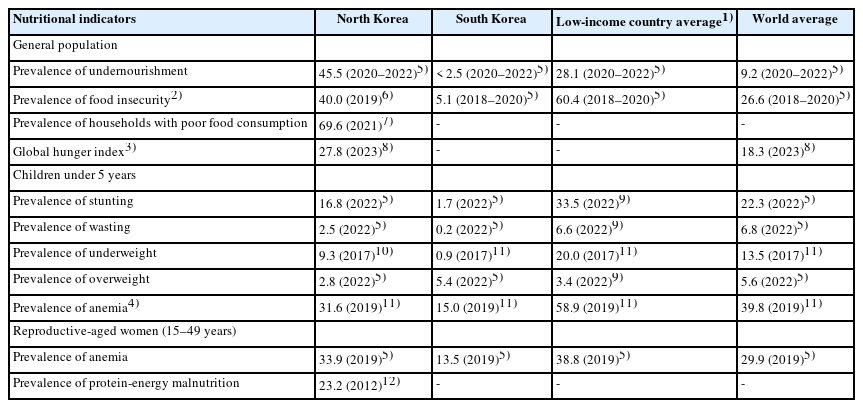Search
- Page Path
- HOME > Search
Research Articles
- [Korean]
- Nutritional status of North Koreans and related perceptions among South Korean adults
- Youngmin Nam, Jihyun Yoon
- Korean J Community Nutr 2024;29(4):288-303. Published online August 31, 2024
- DOI: https://doi.org/10.5720/kjcn.2024.00006

-
 Abstract
Abstract
 PDF
PDF - Objectives
North Koreans have been facing chronic food shortages and malnutrition. This study examined the nutritional status of North Koreans and the perceptions of South Korean adults regarding their nutritional status.
Methods
The nutritional status was examined using nutritional indicators for the general population, children, and reproductive-aged women in North Korea. An online survey was conducted among 1,000 South Korean adults aged 19–69 years to investigate their perceptions regarding the nutritional status of North Koreans.
Results
Although the nutritional status of children in North Korea has consistently improved, significant progress in the general population and reproductive-aged women in the country remains elusive. The prevalence of malnutrition among North Korean children has decreased to a level that is not considered severe based on international standards, although it shows a substantial difference from that among South Korean children. The prevalence of undernourishment and food insecurity in North Korea remains over 40%. South Korean adults perceive the nutritional status of North Koreans as being more severe than it is in reality. Notably, a significant inconsistency exists between the perceived and actual nutritional status of North Korean children, with over 95% of South Korean adults perceiving North Korean children’s malnutrition as being more severe than it actually is. Moreover, South Korean adults in their 20s to 40s tended to perceive the nutritional status of North Koreans as being more severe than those in their 50s to 60s did.
Conclusions
The nutritional status of North Koreans is a matter of concern. The disparity between South Koreans’ perceptions of the nutritional status of North Koreans and the actual status highlights the need for accurate information dissemination to effectively address malnutrition in North Korea. These efforts could be instrumental in enhancing public awareness and fostering social consensus on food aid and nutritional support programs for North Korea.
- 3,866 View
- 72 Download

- [Korean]
- Problems Encountered in Analyzing the Market Size, Purchase, and Consumption of HMR in the Republic of Korea
- Sung Ok Kwon, Injoo Choi, Yoojeong Joo, Jihyun Yoon
- Korean J Community Nutr 2022;27(6):480-491. Published online December 31, 2022
- DOI: https://doi.org/10.5720/kjcn.2022.27.6.480
-
 Abstract
Abstract
 PDF
PDF - Objectives
This study examined the problems encountered when analyzing the market size, purchase, and consumption of HMR (home meal replacements) in the Republic of Korea.
Methods
The macro data relevant to the market size and purchase status of HMR were critically summarized. The micro data retrieved from the 2019 & 2020 Korea National Health and Nutrition Examination Survey (KNHANES) were analyzed to understand the consumption of HMR.
Results
The Korea Agro-Fisheries & Food Trade Corporation and the Ministry of Food and Drug Administration reported the market size of HMR, whereas the Korean Rural Economic Institute and the Rural Development Administration reported the purchase expense and frequencies of HMR. Since the values on the market size and purchase status were calculated or surveyed using different scopes of HMR, there have been reliability issues for the data presented. Additionally, lack of consensus on the use of Korean terms corresponding to HMR was found to be a problem. To examine the consumption of HMR, analysis of the food intake data from KNHANES presented results with very low validity due to the inappropriate survey and coding scheme not reflecting the inclusion of new food types.
Conclusions
Several problematic discrepancies were encountered in the statistics on HMR. The fundamental cause of these problems was the absence of agreement on the scope of HMR and the Korean terms corresponding to it. Considering the increasing importance of HMR in Korean diets, urgent cooperative efforts are required between the government and academia to derive an agreed Korean term and establish the scope of HMR. -
Citations
Citations to this article as recorded by- Sustainable Human Resource Management in Emergencies: The Case of the Lithuanian Logistics Sector
Kristina Čižiūnienė, Gabrielė Voronavičiūtė, Dragan Marinkovic, Jonas Matijošius
Sustainability.2025; 17(6): 2591. CrossRef - Evaluation of Thermal Resistance in Geobacillus thermodenitrificans subsp. Calidus and Ureibacillus suwonensis Spores Isolated in Korea
Ju-Hee Nam, Du-Yeong Jung, Zi-On Choi, Hyun-Jung Jung, Jung-Beom Kim
Journal of Food Hygiene and Safety.2025; 40(1): 13. CrossRef - Physicochemical Properties and Quality Analysis of Miichthys miiuy Products Processed by Drying and Smoking
Yu-Jin Heo, Hayoun Kim, Hae-In Lee
Journal of the Korean Society of Food Science and Nutrition.2025; 54(7): 629. CrossRef - Survey on consumer perceptions, health benefits and preferences of kindergarten and school foodservices in Korea, including related keywords reported in newspaper: a mixed-methods study
Gyoungok Gang, Chaewon Park, Hyeja Chang
Korean Journal of Community Nutrition.2025; 30(4): 309. CrossRef - Eating behaviors, home meal replacement consumption, and nutrition quotient: a comparative study of male shift and non-shift workers in Chungcheong, Korea
Yeon Jin Lee, Munkyong Pae
Nutrition Research and Practice.2025; 19(5): 758. CrossRef - Usage and Quality Satisfaction of Convenience Food at Convenience Stores according to the Eating Behavior of University Students in Southern Gyeonggi Province
Se-In Oh, Ok-Sun Kim
Journal of the East Asian Society of Dietary Life.2023; 33(6): 492. CrossRef
- Sustainable Human Resource Management in Emergencies: The Case of the Lithuanian Logistics Sector
- 5,682 View
- 129 Download
- 6 Crossref


 KSCN
KSCN

 First
First Prev
Prev



